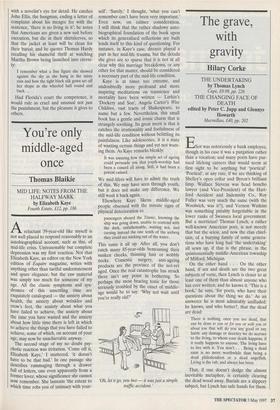You're only middle-aged once
Thomas Blaikie
MID LIFE: NOTES FROM THE HALFWAY MARK by Elizabeth Kaye Fourth Estate, £12, pp. 186 Areluctant 39-year-old like myself is not well placed to respond reasonably to an autobiographical account, such as this, of mid-life crisis. Unreasonable but complete depression was my first reaction. Not that Elizabeth Kaye, an editor on the New York edition of Esquire magazine, writes with anything other than tactful understatement and spare elegance, but the raw material was simply too much for someone of my age. All the classic symptoms and syn- dromes of this unsettling time are exquisitely catalogued — the anxiety about health, the anxiety about wrinkles and crow's feet, the anxiety about what you have failed to achieve, the anxiety about the time you have wasted and the anxiety about how little time there is left in which to achieve the things that you have failed to achieve, some of which, on account of your age, may now be unachievable anyway.
The second stage of my no doubt psy- chotic reaction was irritation. 'Come off it, Elizabeth Kaye,' I muttered, 'it doesn't have to be that bad.' In one passage she describes rummaging through a drawer full of letters, one even apparently from a former lover, whose significance she cannot now remember. She laments 'the extent to which time robs you of intimacy with your- self. 'Surely,' I thought, 'what you can't remember can't have been very important.' Even now, on calmer consideration, I still think that the rather shadowy auto- biographical foundation of the book upon which its generalised reflections are built lends itself to this kind of questioning. For instance, in Kaye's case, divorce played a part in her mid-life trauma, but the details she gives are so sparse that it is not at all clear why this marriage breakdown, or any other for that matter, should be considered a necessary part of the mid-life condition.
Kaye is at times too extreme, and undoubtedly more profound and more inspiring meditations on transience and mortality have been written — Larkin's `Dockery and Son', Angela Carter's Wise Children, vast tracts of Shakespeare, to name but a few. Nevertheless, this small book has a gentle and ironic charm that is strangely soothing. Its great merit is that it catches the irrationality and foolishness of the mid-life condition without belittling its painfulness. Like adolescence, it is a state of wanting certain things and yet not want- ing them. As Kaye remarks bleakly:
It was amazing how the simple act of ageing could persuade you that youth-worship had been a canard all along. Still, it had been a potent canard.
We mid-lifers will have to admit the truth of this. We may have seen through youth, but it does not make any difference. We still want it back again.
Elsewhere Kaye likens middle-aged people obsessed with the minute signs of physical deterioration to passengers aboard the Titanic, knowing the ship was going down, unable to contend with the dark, unfathomable, waiting sea, and cursing instead the one tenth of the iceberg they could see sticking out of the water.
This sums it all up. After all, you don't catch many 85-year-olds bemoaning their sunken cheeks, thinning hair or wobbly necks. Comestic surgery, anti-ageing products are the province of the not-yet aged. Once the real catastrophe has struck there isn't any point in bothering. So perhaps the most bracing tonic for those seriously troubled by the onset of middle- age would be to say: 'Why not wait until you're really old?'
`Oh, let it go, you two — it was just a simple traffic accident.'


































































 Previous page
Previous page